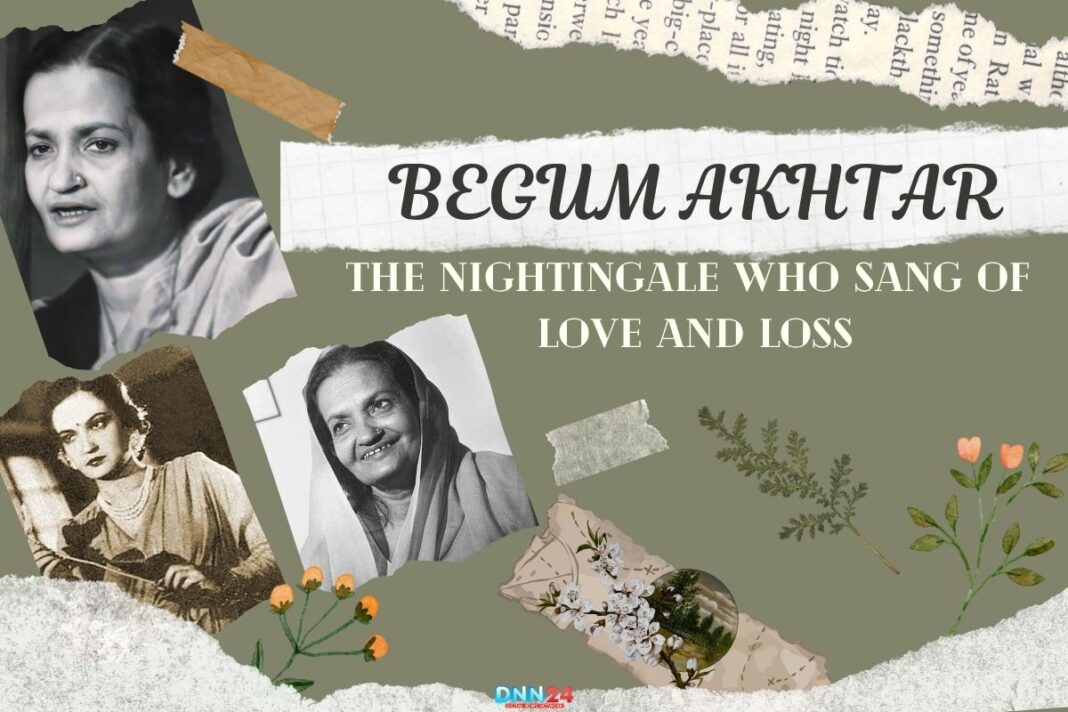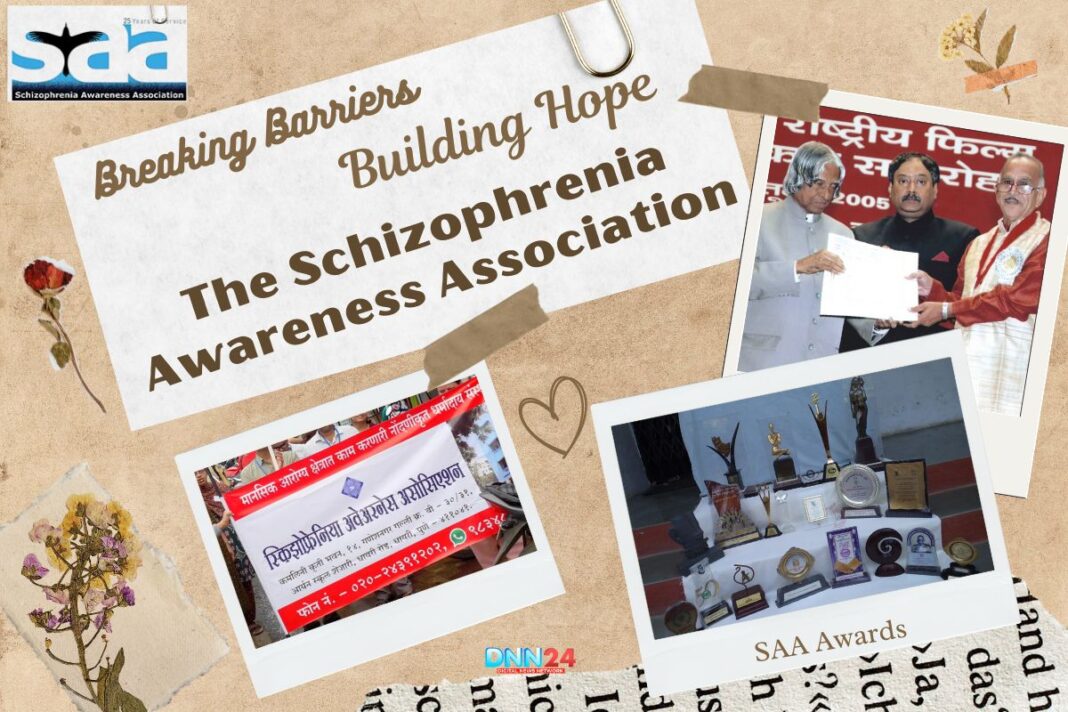Begum Akhtar, Born Akhtari Bai Faizabadi on 7th October 1914 in the fragrant lanes of Faizabad, began her story in the shadow of sorrow and hope. The family was broken when her father, Asghar Hussain, began ignoring his wife, Mushtari Bai and left their two daughters to manage life alone. As a child, she found comfort in music, which gently washed over her emotional dryness.
Ever since he was a child, Akhtar listened to Chandra Bai sing and tried to feel her music in his heart. When her uncle recognized her musical gift, he invited her to study with Ustad Imdad Khan. When she grew older, she worked with maestros Ata Mohammed Khan and Abdul Waheed Khan and began to learn the essence of classical music. At fifteen, Sarodbala started singing in public, and Sarojini Naidu warmly praised her first concert in Calcutta.
ye na thi hamari qismat ki visal-e-yar hota
Sung by Begum Akhtar
agar aur jite rahte yahi intizar hota
tere wade par jiye hum to ye jaan jhuT jaana
ki KHushi se mar na jate agar e’tibar hota
teri nazuki se jaana ki bandha tha ahd boda
kabhi tu na toD sakta agar ustuwar hota
It was not only a story about becoming famous but also a narrative about a person who unexpectedly discovered her voice in the midst of silence.
From Bai to Begum: The Transformation
A New Name, A New Destiny
Her fame grew very fast. Megaphone Recording Company had to acquire new equipment because her music was selling so well that everyone wanted to listen. As soon as “Deewana banana hai toh deewana bana de” came out, hearts across the country started to love it. Soon, films called to her, and she sang in Calcutta and Bombay, her singing adding a special touch to the movies.
diwana banana hai to diwana bana de
Sung by Begum Akhtar
warna kahin taqdir tamasha na bana de
ai dekhne walo mujhe hans hans ke na dekho
tum ko bhi mohabbat kahin mujh sa na bana de
main DhunDh raha hun meri wo shama kahan hai
jo bazm ki har chiz ko parwana bana de
aaKHir koi surat bhi to ho KHana-e-dil ki
kaba nahin banta hai to but-KHana bana de
‘bahzad’ har ek gam pe ek sajda-e-masti
har zarre ko sang-e-dar-e-jaanana bana de
In 1945, she met barrister Ishtiaq Ahmed Abbasi, and love became a part of her life. With marriage, Akhtari Bai became Begum Akhtar, shedding the ‘Bai’ tag for the regal ‘Begum.’ Unfortunately, this new life also meant she was not allowed to share her ideas for nearly five years, and this caused her health to suffer.
Kuchh To Duniya Ki Inayat Ne Dil Tod Diya
Sung by Begum Akhtar
Kuchh to duniya ki inayat ne dil tod diya,
Aur kuchh talkhi-e-halaat ne dil tod diya.
Hum to samjhe the ki barsaat mein barsegi sharaab,
Aayi barsaat to barsaat ne dil tod diya
Thanks to her doctor’s recommendation, she went back to singing, feeling nervous and sad, and sang at All India Radio in 1949. Listening to his music healed her, and she was embraced by the fans again.
Her Voice and Its Effect: Ghazal, Thumri and Dadra
Begum Akhtar’s voice was like a river—sometimes calm, sometimes wild, always deep. Because of her great skill in ghazals, thumri, and dadra, she was known as the Queen of Ghazals. She only said the words that she had already loved the most, which meant her words truly came from her heart.
Wo Jo Hum Mein Tum Mein Qaraar Tha
Sung by Begum Akhtar
Woh jo hum mein tum mein qarar tha, tumhein yaad ho ke na yaad ho,
Wahi yaani vaada nibhaane ka, tumhein yaad ho ke na yaad ho.
Woh jo lutf mujh pe the barasht, woh karam ke thaam ghane,
Woh tumhein yaad ho ke na yaad ho
Because she underwent classical training, her voice was unusually rich. She sang tunes from every scale, and her singing was smooth and blended her Punjab, Benares, and Lucknow styles. Many artists, such as Pandit Jasraj, were inspired by her music, and poets, such as Agha Shahid Ali, were impressed by her voice.
Her ghazals always had a connection to rags from Hindustani classical music, which allowed listeners to feel them.
Also Read: Meer Anees: The Soulful Storyteller of Urdu Poetry
Unheard Kissey: The Storeys That Weren’t Shared
Cigarettes, a rainy scene, and the awesome atmosphere.
While Sarah’s performances looked impressive off the stage, she went through both happy and challenging moments. Once, the story happened on a rainy night in Srinagar. The poet Agha Shahid Ali recalled how Begum Akhtar, stranded due to a canceled flight, stayed at his family’s home. At midnight, she found out she was out of her favorite Capstan cigarettes. Thus, Shahid and his brother took her through the rain to go shopping, and there was laughter mixed with the smells of rain and tobacco in the car.
Tabiyat In Dino Begana-e-Gham Hoti Jaati Hai
Sung by Begum Akhtar
Tabiyat in dino begana-e-gham hoti jaati hai,
Mere hisse ki goya har khushi kam hoti jaati hai.
Wahi hai shamma lekin roshni kam hoti jaati hai,
Hawa-e-bad se lahu ki aab bhi kam hoti jaati hai
It is also said that she could smoke wherever she performed, even inside the radio studios, which was rare for her time. Years of not singing did not change her passion for music. When she came back to the microphone, her eyes filled with tears, and she let them blend in with her notes.
mere ham-nafas mere ham-nawa mujhe dost ban ke dagha na de
Sung by Begum Akhtar
main hun dard-e-ishq se jaan-ba-lab mujhe zindagi ki dua na de
mere dagh-e-dil se hai raushni isi raushni se hai zindagi
mujhe Dar hai ai mere chaara-gar ye charagh tu hi bujha na de
These moments, which occur somewhere in the middle of her career, help us see the human side of her big life story.
The Power of Her Nazm: Romance in Every Note
Begum Akhtar’s nazms were not just songs—they were sighs, whispers, and stolen glances. The mixed feelings of longing and surrender made her romantic nazms very attractive. The words flowed like heartbeats, and each note was a gentle caress. She wrote of missing her lover and partying all night without a single moment of rest.
Her poetry, for example, “Ae Mohabbat Tere Anjaam Pe Rona Aaya,” was steeped in the scent of unrealized desires. Listening to her sing was like having the night’s moonlight turn into music, and every sigh of love was sung with her.
ai mohabbat tere anjam pe rona aaya
Sung by Begum Akhtar
jaane kyun aaj tere nam pe rona aaya
yun to har sham umidon mein guzar jati hai
aaj kuchh baat hai jo sham pe rona aaya
kabhi taqdir ka matam kabhi duniya ka gila
manzil-e-ishq mein har gam pe rona aaya
She wrote nazms about more than simply the pain she felt. The nakshatra was playful, the smile teasing, and a hope remained hidden. Her songs spoke of first love, secret dates, looks from the heart, and lips that could not keep still.
Tabiyat In Dino Begana-e-Gham Hoti Jaati Hai
Sung by Begum Akhtar
Tabiyat in dino begana-e-gham hoti jaati hai,
Mere hisse ki goya har khushi kam hoti jaati hai.
Wahi hai shamma lekin roshni kam hoti jaati hai,
Hawa-e-bad se lahu ki aab bhi kam hoti jaati hai.
Through her nazms, Begum Akhtar taught the world that romance is not just in union but in yearning. Every heartbreak sounded beautiful because of her voice, and every longing became poetic.
The Last Song: Her Final Performance and Legacy
Begum Akhtar’s life was a tapestry of music woven with threads of joy and sorrow. While she was performing a concert in Ahmedabad on 30th October 1974, she had a heart attack and died, leaving her last breath with her final note. In the end, she showed her passion and love for music in her life and her death.
Koi Ummeed Bar Nahi Aati
Sung by Begum Akhtar
Koi ummeed bar nahi aati, koi soorat nazar nahi aati,
Maut ka ek din muayyan hai, neend kyon raat bhar nahi aati.
Aage aati thi haal-e-dil pe hansi, ab kisi baat par nahi aati,
Hum wahan hain jahan se humko bhi, kuchh hamari khabar nahi aati.
Her influence can be seen in about four hundred songs, in the hearts of fans all over the world, and in the voices of people who admire her. The government gave her the Padma Shri and the Sangeet Natak Akademi Award, and she was honored with the Padma Bhushan after her death. Her real reward came from the affection she received, the sorrows she turned into beautiful songs, and the people her music reached.
The Storey Ends: Eternal Songbird
Begum Akhtar’s life was a nazm—sometimes gentle, sometimes fierce, always beautiful. She gave her sadness to poetry and her desire to sing. Her voice is heard off in the distance, reminding us that talent alone cannot make art: you also need the courage to feel deeply.
Ishq Mein Ghairat-e-Jazbaat Ne Rone Na Diya
Sung by Begum Akhtar
Ishq mein ghairat-e-jazbaat ne rone na diya,
Warna kya baat thi kis baat ne rone na diya.
Aap ke aane ki kya ummeed magar,
Kaise kah doon ki is aahat ne rone na diya.
Although known as a singer, her story includes the courage she had to sing without being stopped by others. She has always been and always will be, the greatest ghazal singer, the bearer of longing, and the symbol of romance.
Also Read: Amir Khusrau: Poet, Mystic, Musician, and Cultural Icon
You can connect with DNN24 on Facebook, Twitter, and Instagram and subscribe to our YouTube channel.



